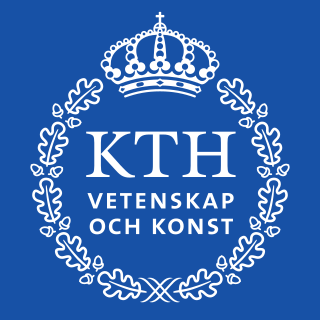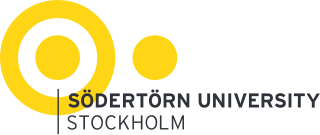
KTH Royal Institute of Technology, abbreviated KTH, is a public research university in Stockholm, Sweden. KTH conducts research and education within engineering and technology, and is Sweden's largest technical university. Currently, KTH consists of five schools with four campuses in and around Stockholm.

Pharmacia was a pharmaceutical and biotechnological company in Sweden that merged with the American pharmaceutical company Upjohn in 1995.

The Karolinska Institute is a research-led medical university in Solna within the Stockholm urban area of Sweden. The Nobel Assembly at the Karolinska Institute awards the Nobel Prize in Physiology or Medicine. The assembly consists of fifty professors from various medical disciplines at the university. The current rector of Karolinska Institute is Ole Petter Ottersen, who took office in August 2017. The Karolinska Institute is consistently ranked amongst the world's best medical schools, ranking 6th worldwide for medicine in 2021.

Södertörn University is a public university college located in Flemingsberg in Huddinge Municipality, and the larger area called Södertörn, in Stockholm County, Sweden. In 2013, it had about 13,000 full-time and part-time students. The campus area in Flemingsberg hosts the main campus of SH, several departments of the Karolinska Institutet, and the School of Technology and health of the Royal Institute of Technology (KTH). The Karolinska University Hospital, Huddinge, is also located there. The university is unique in the sense that it's the only higher educational institution in Sweden that teaches and researches philosophical schools such as German idealism, existentialism, deconstruction as well as critical theory and other views which are excluded from the traditional anglosaxan analytical philosophy.

The Karolinska University Hospital is a teaching hospital affiliated with Karolinska Institutet in Stockholm, Sweden, with two major sites in the municipalities of Solna and Huddinge. The hospital network is the second largest in Sweden, after Sahlgrenska University Hospital.
Patrick Cramer is a German chemist, structural biologist, and molecular systems biologist. In 2020, he was honoured to be an international member of the National Academy of Sciences.
Education in Stockholm goes back to 1583, when the small college Collegium Regium Stockholmense was founded in by King John III in Stockholm, Sweden.

Charles David Allis is an American molecular biologist, and is currently the Joy and Jack Fishman Professor and head of the Laboratory of Chromatin Biology and Epigenetics at The Rockefeller University.

Kerstin Lindblad-Toh is a scientist in comparative genomics, specializing in mammalian genetics. She is the Scientific Director of vertebrate genomics at the Broad Institute and a professor in comparative genomics at Uppsala University. In 2010 she co-founded Science for Life Laboratory (SciLifeLab) together with Mathias Uhlén and acted as Co-Director until 2015. As the leader of the Broad Institute's Mammalian Genome Initiative she has led the effort to sequence and analyze the genomes of various mammals, including mouse, dog, chimpanzee, horse, rabbit and opossum. She has researched extensively on the genetics of dogs, identifying genes and genetic variants important in disease susceptibility, morphology and behavior.
Tomas Hökfelt is a Swedish physician and former professor in histology at the Karolinska Institutet from 1979 until 2006, when he got his emeritate. He was linked to the Department of Neuroscience and is specialized in cell biology.
S* is the diminutive for the S* Life Science Informatics Alliance, a collaboration between seven universities and the Karolinska Institutet of Sweden, and its course, the S-Star Bioinformatics Online course. The goal is to provide course material for training in bioinformatics and genomics.

Jan-Åke Gustafsson is a Swedish scientist and professor in Biology, Biochemistry and Medical Nutrition. When he decided to move to Houston, Texas, USA, in 2008, the State of Texas decided to give a major US $ 5.5 million research grant to the University of Houston, enabling the establishment of the Center of Nuclear Receptors and Cell Signaling under the leadership of Jan-Åke Gustafsson. The grant was announced at a February 5, 2009, press conference by Rick Perry, Governor of Texas and running for the Republican nomination for President of the United States in the 2012 presidential election.

Professor Nils Gunnar Hansson von Heijne, born 10 June 1951 in Gothenburg, is a Swedish scientist working on signal peptides, membrane proteins and bioinformatics at the Stockholm Center for Biomembrane Research at Stockholm University.
The Lennart Nilsson Award recognizes outstanding contributions to scientific photography. Honorees are chosen based on the merits of their efforts in scientific imagery. It is administered by the foundation Stiftelsen Lennart Nilsson and awarded annually by Karolinska Institutet. The award sum is SEK 100,000. The award was inaugurated in 1998 in honor of Swedish photographer and scientist Lennart Nilsson (1922–2017) .

Fritiof Stig Sjöstrand was a Swedish physician and histologist born in Stockholm. He started his medical education at Karolinska Institutet in 1933, where he received his Ph.D. Karolinska Institutet in 1944. Sjöstrand worked as an assistant at the department of pharmacology, where he first had used polarization microscopy, he first heard about the new method of electron microscopy in 1938, within which he would become a pioneer. Manne Siegbahn at the Nobel Institute for Physics had planned to build an electron microscope in Sweden, and Sjöstrand got involved in the project to explore its use in medical research. The main challenge was to produce sufficiently thin samples, and Sjöstrand's method for producing ultrathin tissue samples was published in Nature in 1943. However, it seemed that research based on electron microscopy would be too time-consuming for a Ph.D. thesis, so his 1944 thesis was based on fluorescence spectroscopy. In 1947-1948, he received a scholarship to further study electron microscopy at Massachusetts Institute of Technology's Department of Biology. Back in Sweden, he received funding to build up an electron microscopy research laboratory. In 1959, Sjöstrand was both offered a position as professor of histology at Karolinska Institutet, and as professor at University of California, Los Angeles (UCLA). He chose UCLA, because conditions for research and funding were better there.
Karin M. Hehenberger, M.D., Ph.D. is a Swedish physician, investor, business executive, and diabetes expert, known for her work in the field of biotechnology. She has written numerous articles on biotechnology that have been published in peer review journals and worked as an executive for different biotechnology companies and investment firms. She is a faculty member in the department of Molecular Medicine at the Karolinska Institute where she also obtained her M.D. and a Ph.D. in molecular medicine. She has lectured on the topics of autoimmune diseases, diabetes, molecular medicine and industry challenges as well as provided commentary for Fox News, Good Morning America Health, New York One, the USA Today and Forbes.
Per Svenningsson is a neurologist specializing in the neuropharmacology of movement disorders such as Parkinson’s disease. He is a professor of neurology at the Department of Clinical Neuroscience at the Karolinska Institutet and in the Department of Neurology at Karolinska University Hospital in Stockholm, Sweden. He is the team leader of a research group that studies the underlying pathogenic process of PD. Svenningsson is also a member of many research councils and committee, including the European College of Neuropsychopharmacology (ECNP).
Hans-Olov Adami is a Swedish physician, academic and public health researcher. He established the largest epidemiologic and biostatistics research unit in Sweden, the Department of Medical Epidemiology and Biostatistics at the Karolinska Institutet. He is a former chair of the Department of Epidemiology at the Harvard School of Public Health in Boston, US.
Mathias Uhlén is a Swedish biologist, biotechnologist, and Professor of Microbiology at Royal Institute of Technology (KTH), Stockholm. His research interests cover antibody engineering, proteomics and precision medicine.
The Institute for Molecular Medicine Finland (FIMM) is an international research institute which investigates the molecular mechanism of diseases by methods involving genetics and medical systems biology. The research combines technology and high-level research with unique patients and biobank materials. The aim of FIMM is to transfer research data to medical use in healthcare, i.e. improving and promoting personalised medicine.










